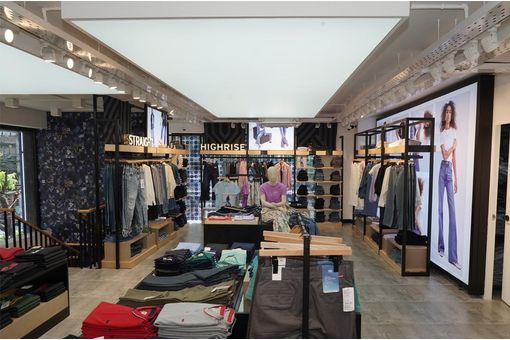Interviews
'Disputes in B'desh RMG sector triggered by wages'
30 Nov '15
3 min read
Over 52 per cent labour unrest that took place in Bangladesh's readymade garment (RMG) sector was over dues of wage and overtime allowance, according to a study, Bangladeshi newspapers have reported.
The study conducted jointly by Bangladesh Institute of Labour Studies (BILS) and Germany-based Friedrich Ebert Stiftung, found 18.8 per cent agitation was linked to demands for wage hike and other benefits, while 12.1 per cent was for disputes over employment contract.
The garment sector witnessed some 165 incidents of disputes out of the total 246 in 2014, said Professor Jakir Hossain of Rajshahi University who prepared the report. Hossain presented the findings of the study at a seminar on 'State of Labour Tripartism in Bangladesh's Garment Sector and the Scope of Harmonious Industrial and Labour Relations' in Dhaka.
Of 230 industrial disputes in 2013, 199 took place in the garment sector.
Most of the disputes could have been resolved had there been an effective tripartite system, involving equal representation of factory management, trade union leaders and government representatives, Hossain said.
However, in case of Bangladesh, tripartite mechanisms cannot work effectively mainly due to a weakness of the trade union leaders, against strong and organised owners and government representatives.
“In the case of workers' representatives, they cannot be organised as they are divided.”
Roy Ramesh Chandra, a BILS member, said the weakest point of the garment sector in Bangladesh is that the sector does not come under any particular ministry. As a result, when a dispute arises, many ministries and agencies try to resolve those and finally, very little is done effectively, he added.
Wajedul Islam Khan, secretary to the executive committee of BILS, said the tripartite committees in the garment sector cannot work effectively mainly because of a lack of monitoring by the government.
Shahidullah Azim, former vice-president of Bangladesh Garment Manufacturers and Exporters Association (BGMEA), said the arbitration cell of the association can be a good example of a tripartite committee.
So far, 8,658 out of 9,550 disputes have been resolved through the BGMEA's arbitration cell; in the resolved cases, the owners have paid Taka 30.43 crore to the workers, he added.
Nazma Akter, president of Sammilito Garment Sramik Federation, a rights group, called for social dialogues among workers, owners, trade union leaders and government officials so that the disputes can be resolved in a peaceful way. (SH)
The study conducted jointly by Bangladesh Institute of Labour Studies (BILS) and Germany-based Friedrich Ebert Stiftung, found 18.8 per cent agitation was linked to demands for wage hike and other benefits, while 12.1 per cent was for disputes over employment contract.
The garment sector witnessed some 165 incidents of disputes out of the total 246 in 2014, said Professor Jakir Hossain of Rajshahi University who prepared the report. Hossain presented the findings of the study at a seminar on 'State of Labour Tripartism in Bangladesh's Garment Sector and the Scope of Harmonious Industrial and Labour Relations' in Dhaka.
Of 230 industrial disputes in 2013, 199 took place in the garment sector.
Most of the disputes could have been resolved had there been an effective tripartite system, involving equal representation of factory management, trade union leaders and government representatives, Hossain said.
However, in case of Bangladesh, tripartite mechanisms cannot work effectively mainly due to a weakness of the trade union leaders, against strong and organised owners and government representatives.
“In the case of workers' representatives, they cannot be organised as they are divided.”
Roy Ramesh Chandra, a BILS member, said the weakest point of the garment sector in Bangladesh is that the sector does not come under any particular ministry. As a result, when a dispute arises, many ministries and agencies try to resolve those and finally, very little is done effectively, he added.
Wajedul Islam Khan, secretary to the executive committee of BILS, said the tripartite committees in the garment sector cannot work effectively mainly because of a lack of monitoring by the government.
Shahidullah Azim, former vice-president of Bangladesh Garment Manufacturers and Exporters Association (BGMEA), said the arbitration cell of the association can be a good example of a tripartite committee.
So far, 8,658 out of 9,550 disputes have been resolved through the BGMEA's arbitration cell; in the resolved cases, the owners have paid Taka 30.43 crore to the workers, he added.
Nazma Akter, president of Sammilito Garment Sramik Federation, a rights group, called for social dialogues among workers, owners, trade union leaders and government officials so that the disputes can be resolved in a peaceful way. (SH)
Fibre2Fashion News Desk – India
Popular News
































-Ltd..jpg?tr=w-120,h-60,c-at_max,cm-pad_resize,bg-ffffff)





.jpg?tr=w-120,h-60,c-at_max,cm-pad_resize,bg-ffffff)
.jpg?tr=w-120,h-60,c-at_max,cm-pad_resize,bg-ffffff)






